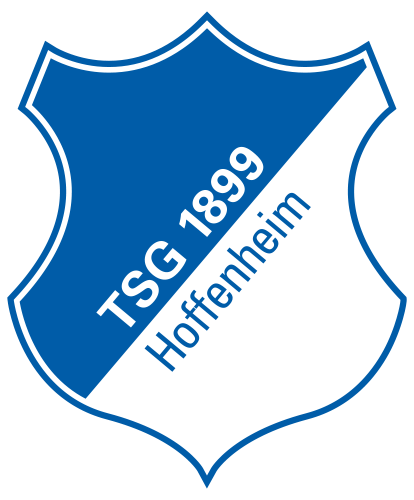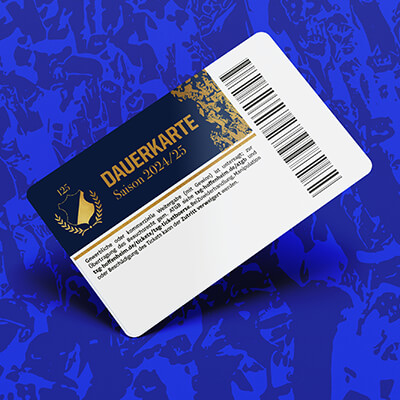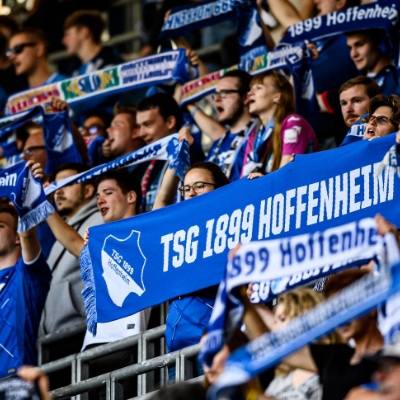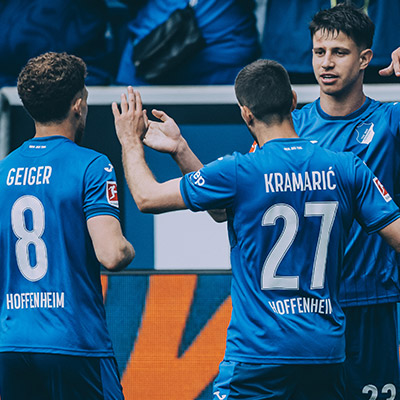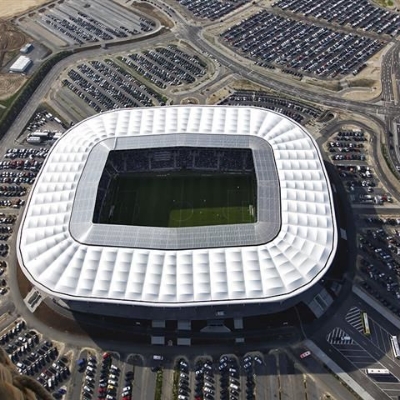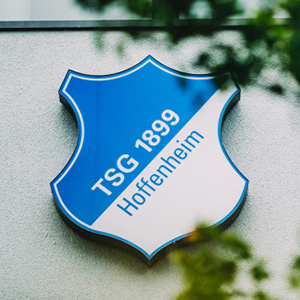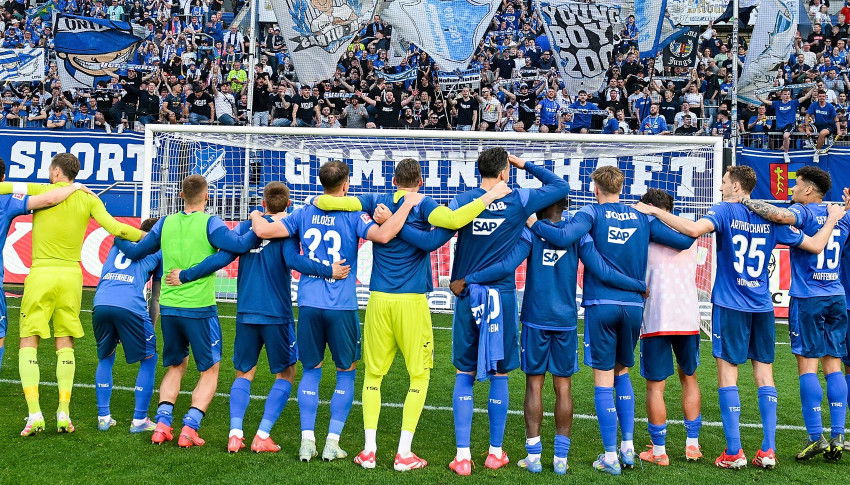Hermann: "Trust is the most important currency"
You left TSG in 2010 and returned this summer, 11 years later. How did that come about?
"I've kept in contact with TSG on and off over the years and have forged some real friendships with people here. Then several things came together. Like the fact Sebastian Hoeness is the coach – he was still a Hoffenheim player back when I first worked for TSG. We never lost contact. And when Prof. Dr. Jan Mayer became managing director this year, the people in charge asked me if I could imagine returning and I gladly accepted."
Hans-Dieter Hermann and Jan Mayer met at the University of Heidelberg in the early 2000s. At that time, Hermann was working at the institute of the renowned sports psychologist and forward thinker Hans Eberspächer, and Mayer later took over the position as his assistant there. Later, Mayer succeeded Hermann at TSG. They came to appreciate each other both personally and professionally: "Jan went a bit more in the diagnostic direction and I went more in the coaching direction. But that's what we always liked about each other, that we could cover these two sides of psychology together and I think that's what made the projects we worked on together successful."
On average, you now work at TSG for two days a week. How should SPIELFELD readers perceive your role? How do the talks or appointments with players or coaches work: do you actively seek contact?
"I try to be available to players and coaches at all times, without it having to turn into a long appointment every time: it needs to have a certain naturalness to it. You sit somewhere, get into a conversation – classically over a meal – and say: let's go into that in more detail. It's always good to have a relaxed exchange, like you might with physiotherapists or athletics coaches, for example. I see myself as part of the team behind the team."
Your presence at matches and training is also important for this reason...
"Exactly, because it needs to feel like a normal exchange. As an outsider, the most important currency, trust, is not so easy to establish. Recently, a player said the day after a training session which I did not attend: Where were you yesterday? I didn't see you. I took that as a compliment."
At TSG home games, you usually sit in the immediate vicinity of the Hoffenheim bench. As an attentive but silent observer of the game. As a sports psychologist, what are your main takeaways from a match?
"It's not like you sit there all the time taking notes and analysing. First and foremost, I watch the game. That helps you recognise dynamics; you see the disappointments and the highs. You see who's in charge, who's pushing others and who's a bit of a worrier, who's a bit down. You sense who you can give a little more encouragement to or who actually has a much more dominant role than they think. But you only notice that when you really experience the players in a match situation. Because the pitch and the dressing room are where the team lives."
Are footballing aspects the main focus of the talks, or are they also about completely different fields?
"It can really cover all sorts. From dealing with boos and failures to concentration in the pursuit of success. But of course it can also be about private things, friendships, relationships."
For TSG, the renewed cooperation with Hans-Dieter Hermann is the logical continuation of the Hoffenheim way. In addition to the daily work on the training ground, psychological support and encouragement for top athletes and young academy talents are "fundamental for TSG to be able to consistently deliver top sporting performance," says managing director Prof. Dr. Jan Mayer. "Football is always a matter of the mind, especially as the game on the pitch is getting faster and faster. It is important to make the right decisions while under maximum physical strain and in psychological pressure situations. This requires mental coaching sessions with an innovative expert like him."
How should we view the stress factor in football? A match played on a big stage, with the challenge of proving oneself in front of tens of thousands of spectators or a television audience of millions...
"That's a difficult question because it's perceived very individually. It starts with the question: what is pressure? There are professional footballers who find nothing more exciting than situations in which the crowd whistles – if it's the opposition fans. Most of them love the stadium environment and it's what allows them to experience the games as they are. That's what they play football for. Performing in front of a crowd, the public nature of it, that's their profession. Having to perform constantly is a fundamental part of the appeal of the Bundesliga – a blessing and a curse, pressure and motivation at the same time. But that's not the true core of the pressure."
How does this manifest itself?
"Pressure often arises in one's early footballing years due to the expectations of others. Sometimes from parents without them intending it. For example, they might be worried that their child won't make it into the next year's team and they pass on these concerns to the child. Later on, as professionals, players can usually handle the pressure of expectation quite well. But when there is extreme criticism in the media and/or insults and insinuations circulating online, just because you don't perform well for a while or because you change clubs, that gets to many people."
Do you also have the feeling that injuries are a particular challenge for players?
"Yes, I wrote my doctoral thesis on dealing with injuries and their psychological impact. That was a long time ago, but the issue is still topical and psychologically relevant, especially for long-term injury absentees. But even in this situation, no-one has to come for a consultation if they do not seek the contact themselves. It is voluntary. And sometimes even small tips help to cope better with rehabilitation, from a mental point of view too."
It's also particularly mentally challenging to be on the sidelines. What do players go through when they are not playing?
"Generally speaking, they're unhappy about it. Everyone who is fit wants to play. And it's hard to be part of a team but not really in the thick of it. It gnaws away at your self-worth, which is connected to the vindication they feel from the outside and within the team too. Players try to showcase themselves in training, but may also feel: things are going well, I wouldn't change the starting XI if I were the coach either. This is not an easy situation, so from a psychological point of view, special attention must always be paid to these players. Moreover, it is also important for a team that these players in particular feel as though they are part of the whole. So-called social exclusion hurts. And you do feel excluded if you don't play. That's also a big area of research in psychology."
Hermann, who runs his own practice in Schwetzingen, has also been active in research and teaching for several decades and received an award from the German Society for Psychology in 2010. Since 2017, Prof. Dr Hans-Dieter Hermann has been an honorary professor at the Institute for Sports Science at the Eberhard Karls University in Tübingen. Hermann also publishes scientific articles on a regular basis, most recently on "Cognitive Training in Sport" (2020, together with Jan Mayer) and before that on "Trust as a Guarantor of a Functioning Society" (2019).
Since your departure 11 years ago, the field of sports psychology has also undergone a significant development at TSG.
"Hoffenheim was already a pioneer on many levels back then – TSG were always interested in innovation and in sports psychology too. Performance diagnostics were already used systematically here 10 years ago, in large part due to Jan Mayer's involvement. This has proven its worth and has been developed. As a result, the link between data and support, also in psychology, has for some time been greater here than anywhere else, to my knowledge."
TSG has some innovative tools at its disposal. To what extent do these conditions help?
"This is very important for our work. In psychology, we sometimes have the problem that we have to rely on qualitative judgments. But by obtaining data on cognitive performance as well, we can substantiate the results much better for optimisation purposes. That's an important point: on the one hand, sports psychology aims to prevent overexertion; on the other hand, we look for development opportunities for every player, even at youth level. And it helps enormously if you can present figures on factors like attention span, ability to switch on or concentration. That motivates the players and you can reason well with the coaches."
What do you particularly like about working here?
"First and foremost, the feeling of being trusted. That is the nicest thing you can get in my profession. What's more for me personally: I received a very warm welcome back. I know from some colleagues that they don't always have it easy at other clubs. But Hoffenheim has also done excellent work in sports psychology in recent years, which was very advantageous ahead of my return here. TSG has its own personality. I like the human aspect here and the spirit of wanting to change and achieve things."
Hermann is a good judge of that, because he has got to know many clubs, associations and individual athletes. As a permanent staff member, he won the World Cup title with the German national football team in Brazil in 2014. He has coached athletes in around 20 Olympic sports, from boxing to hockey to skiing – and has experienced some surprises along the way: "Amateur boxing, for example, is also an enormous team effort where there is great respect for the opponent. The way you support your colleagues or even congratulate your opponent's coach, even though you've been punched in the nose by his protégé beforehand, is incredible."
How does the work at TSG differ from that at the DFB?
"The structure is completely different. With the national team, it's always about a project. A qualifying campaign, a tournament – that's what you always work towards. The difference is often that, with the exception of a tournament, the same team almost never plays. That has an impact on the dynamics, because the positions are not so clearly assigned. In a club team, there is more of an everyday sporting life and the players know much more where they stand. In a national team setup, a lot of things are new for many players, and the intervals until you see each other again can be over four months. In addition, international players are much more public figures. If every nose-picking, every post is a topic in the tabloids, then that's an additional personal challenge."
Football moves people emotionally more than any other sport.
"Definitely, I myself am experiencing childhood dreams in this sport. The fact that I can be here in Hoffenheim or with the national team is still something very special for me. As a young person, you think it's impossible to have such a job in your life. I am really grateful to be involved in this way."



